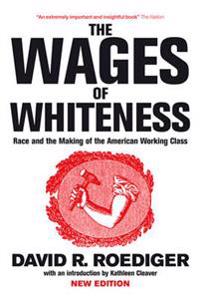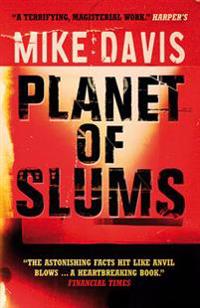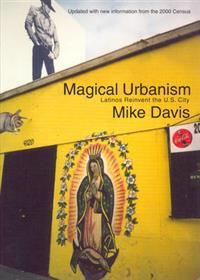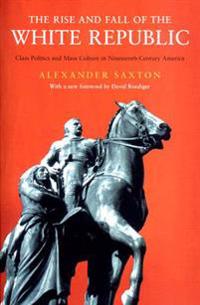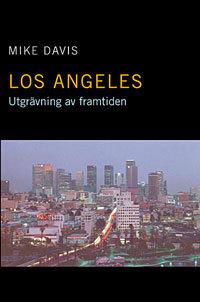Buda's Wagon (Inbunden)
avMike Davis
ISBN: 9781844671328 - UTGIVEN: 2007-04Celebrated urban historian returns with a compelling account of the "poor man's airforce," from Vietnam to Beirut - Davis' most accessible book yet. On a September day in 1920, an angry Italian anarchist named Mario Buda exploded a horse-drawn wagon filled with dynamite and iron scrap near New York'[...]
The Wages of Whiteness (Pocket)
avDavid R. Roediger, Kathleen (INT) Cleaver, Mike (EDT) Davis
ISBN: 9781844671458 - UTGIVEN: 2007-07This is the new, fully updated edition of this now-classic study of working-class racism. Combining classical Marxism, psychoanalysis and the new labor history pioneered by E. P. Thompson and Herbert Gutman, David Roediger's widely acclaimed book provides an original study of the formative years of [...]
Planet of Slums (Häftad)
avMike Davis
ISBN: 9781844671601 - UTGIVEN: 200708With a third of the global urban population already living in Dickensian slums, at least half under the age of twenty, Mike Davis explores the threat of disease, of forced settlement on hazardous terrains, and of state violence on huge populations. He shows also how poverty not only grew massively i[...]
City of Quartz (Häftad)
avMike Davis
ISBN: 9781844675685 - UTGIVEN: 200608No metropolis has been more loved or more hated. To its official boosters, "Los Angeles brings it all together." To detractors, LA is a sunlit mortuary where "you can rot without feeling it." To Mike Davis, the author of this fiercely elegant and wide-ranging work of social history, Los Angeles is b[...]
Imagining the Real (Pocket)
avDavid Davis, Gavin (FRW) Bolton, Mike (AFT) Fleming
ISBN: 9781858565132 - UTGIVEN: 2014-10The current education climate has brought the development of classroom drama as an art form to a standstill. Practitioners need to make a qualitative leap forward in both theory and practice in order to respond to the cultural demands of the times. By linking the best of the ground-breaking work of[...]
Magical Urbanism (Häftad)
avMike Davis
ISBN: 9781859843284 - UTGIVEN: 200109Winner of the 2001 Carey McWilliams Award. This paperback edition of Mike Davis's investigation into the Latinization of America incorporates the extraordinary findings of the 2000 Census as well as new chapters on the militarization of the Border and violence against immigrants.[...]
Late Victorian Holocausts (Häftad)
avMike Davis
ISBN: 9781859843826 - UTGIVEN: 200205Examining a series of El Nino-induced droughts and the famines that they spawned around the globe in the last third of the 19th century, Mike Davis discloses the intimate, baleful relationship between imperial arrogance and natural incident that combined to produce some of the worst tragedies in hum[...]
The Rise and Fall of the White Republic (Pocket)
avAlexander Saxton, David Roediger, Mike Davis
ISBN: 9781859844670 - UTGIVEN: 200307In this acclaimed historical study, Alexander Saxton establishes the centrality of white racism to American politics and culture. Examining images of race at a popular level - from blackface minstrelsy to the construction of the Western hero, from grassroots political culture to dime novels - as wel[...]
The Green Zone (Pocket)
avBarry Sanders, Mike (FRW) Davis, Barry Sanders
ISBN: 9781904859949 - UTGIVEN: 2009-04Das Raumschiff Erde hat keinen Notausgang (Pocket)
avPaul J. Crutzen, Mike Davis, Michael D. Mastrandrea
ISBN: 9783518061763 - UTGIVEN: 2011-05High-rise and the Sustainable City (Häftad)
avMike Davis
ISBN: 9789085940494 - UTGIVEN: 2013-09Can high-rises make a fruitful contribution to making cities more sustainable? Many argue that high-rises deliver positive environmental effects, such as densification, and reduction of traffic and carbon dioxide emissions. But is it really that simple? On closer critical observation many questions [...]
Svält och kolonialism : hur tredje världen underutvecklades (Inbunden)
avMike Davis
ISBN: 9789173430197 - UTGIVEN: 200408Svält och kolonialism berättar historien om hur de brittiska kolonisatörerna till varje pris tillämpade en frihandel som blev förödande för svältande folk i Indien, Kina, Afrika och Brasilien. Förvisso orsakades svälten och hungersnöden av klimatförändringar utanför människors kontrol[...]
Los Angeles : Utgrävning av framtiden (Inbunden)
avMike Davis
ISBN: 9789179241094 - UTGIVEN: 199810Ingen världsstad har blivit mer älskad och mer hatad än Los Angeles. Entusiasterna hävdar att den har allt. Belackarna ser den som en ständigt solbelyst avstjälpningsplats där människor förruttnar utan att märka det. För Mike Davis, författaren till denna intensiva, stilistiskt säkra oc[...]
Slum : världens storstäder (Danskt band)
avMike Davis
ISBN: 9789179242084 - UTGIVEN: 200705Mer än en miljard människor bor i slum. I denna klartänkta och vittfamnande bok utforskar Mike Davis denna ojämlika och instabila värld. Han följer den från sextiotalets "hoppfulla slum" via innerstadsfattigdomens explosiva utveckling under sjuttio- och åttiotalen fram till dagens megaslumom[...]
Ett monster vid vår dörr : fågelinfluensan som globalt hot. (Inbunden)
avMike Davis
ISBN: 9789197603102 - UTGIVEN: 2006031918-1919 dog mellan fyrtio miljoner och etthundra miljoner människor av en dittills okänd influensa som gått till historien som "spanska sjukan" - den dödligaste enskilda händelsen i mänsklighetens historia.
1997 utbröt i Hongkong en ny typ av influensa - H5N1 - som sedan dess spridit s[...]Fronesis 18 Staden (Tidskrift)
avDavid Harvey, Mike Davis, Saskia Sassen
ISBN: 9789197691857 - UTGIVEN: 200903Mer än halva mänskligheten bor nu i städer. Och det är inte i nord som den största tillväxten av stadsbefolkningar sker, utan i syd. Föreställningen om syd som ruralt och jordbruksdominerat, i motsats nord som antas vara urbant och industriellt, förefaller därmed inte längre vara giltig. [...]


